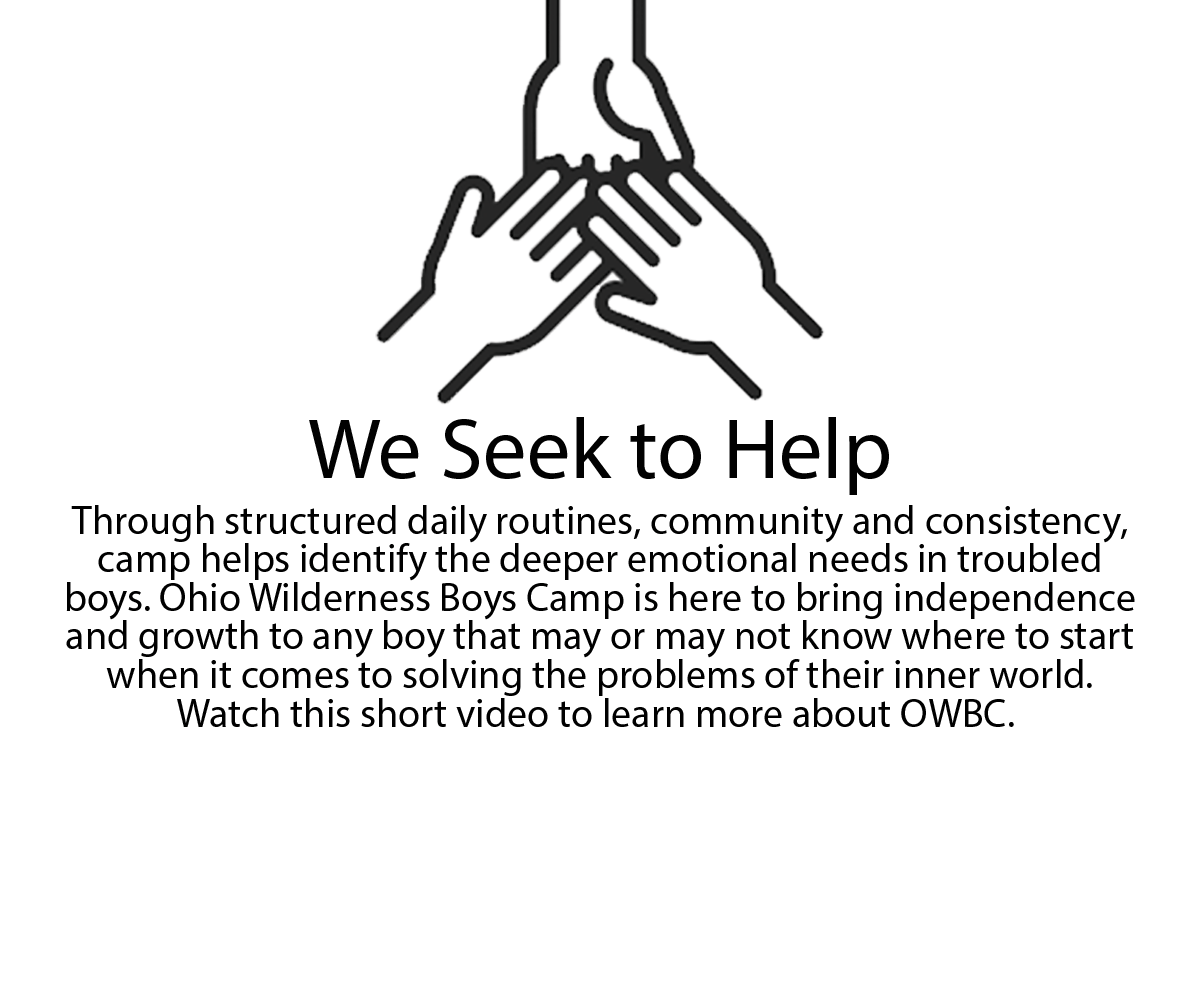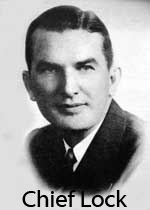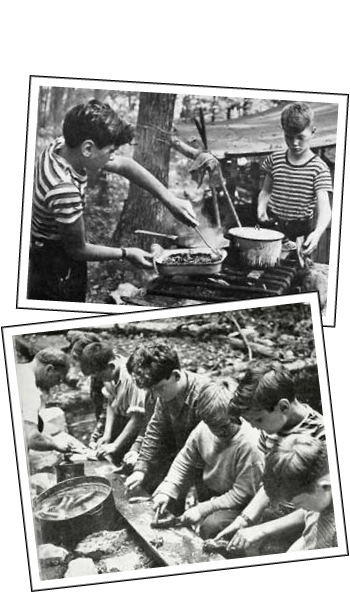About us

Our staff
Two responsible, positive young men lead each group of up to ten boys 24 hours a day as mentors (Chiefs). Groupwork Supervisors and the Program Director oversee and help the Chiefs. The Camp Director, Secretaries, Cooks, and Maintenance provide the support team needed beyond that in the office, kitchen and shop. Family Workers interact with the families before, during, and after their son’s stay at Camp. The number of boys at Camp is limited to forty so that every staff member can personally be acquainted with each Camper. At Camp we are not trying to ‘fix’ a boy. Neither do we do things ‘for’ our boys or ‘to’ our boys. In all that we do, we do things ‘with’ our boys. We provide a caring, highly supportive structure in a boy’s life that helps him succeed where he knows he has a history of failure. Campers set their own attitude / behavior goals and then our entire Camp staff strives to make him successful.
Our Facility
Ohio Wilderness Boys Camp utilizes over 600 acres of upper Ohio River valley wilderness, which is stimulating for boys. This natural space is tolerant of boys’ socially-unacceptable behavior so that their deeper needs can be identified and met. Much of every boy’s stay at Camp will be in the primitive campsite that his group designs, builds, and maintains. The groups also use a modern shower house, dining hall (called Chuckwagon), and library. Also, at the Camp Trading Post, boys purchase needed items through a Camp checkbook while learning about budgeting, saving, and wise spending habits. Camp’s office and maintenance shop round out the non-wilderness part of Camp. The staff is housed on property for 24-hour availability to our campers.
Our History
OWBC first enrolled boys in 2009, operating as a Residential Camp permitted by Noble County Department of Health. OWBC was further licensed by Ohio Department of Job and Family Services in October 2016 as a Private, Non-Profit, Therapeutic Wilderness Camp. OWBC Outdoor Experiential School is registered as a Non-Chartered, Non-Tax Supported School with the Ohio Department of Education. OWBC is a member of Wilderness Road Therapeutic Camping Association (WRTCA).
The Wilderness Road Therapeutic Camping model was born out of the medical and social problems caused among children by the intense urbanization of the early 1900’s. Education and child-development pioneer John Dewey was promoting new ideas about the value of experiential education. In 1925, John Dewey recommended one of his students, L.B. Sharp, to work with Time-Life magazine to reorganize Life’s summer camps and set them on an educational basis with the goal of further helping hurting children in New York State.

 In the mid-1940’s, the Salesmanship Club in Texas heard about the success of the New York programs and hired Campbell Loughmiller to run a similar program. Using Sharp’s model and realizing the value of relationships, Loughmiller and the program sponsors soon discovered the value of long-term, primitive camping for behaviorally maladjusted boys and developed the Wilderness Road Therapeutic Camping model.
In the mid-1940’s, the Salesmanship Club in Texas heard about the success of the New York programs and hired Campbell Loughmiller to run a similar program. Using Sharp’s model and realizing the value of relationships, Loughmiller and the program sponsors soon discovered the value of long-term, primitive camping for behaviorally maladjusted boys and developed the Wilderness Road Therapeutic Camping model.
Over the last 60 years, Camps have operated across the United States serving thousands of boys resulting in a finely tuned therapeutic program. The Wilderness Road Therapeutic Camping Association (WRTCA) oversees the present-day Camps who hold true to the founder’s basic principles. These Camps employ a universal Biblical ethic as we help boys learn to choose attitudes and actions that are right, instead of those that damage themselves and others. The WRTCA conducts training and provides assistance to new Camps beginning to help boys who are experiencing trouble. In keeping with the intent of the universities and social/behavioral professionals that originally designed the Camp program, Camps continue to emphasize the boys’ ownership of the process of problem identification and goal-setting rather than those foundational elements coming from professionally trained adults.
Over the decades, studies show that Camp is 70-85% successful at helping boys grow beyond their behavioral and attitude problems. Post-graduation follow-up has become more important in recent years as each Camper returns home to his community to live out what he has learned at Camp.
As a new millennium has begun, our children face new and different stresses that include the ‘uninvolved father’ as part of a totally changed family structure, changing societal morals, wide-spread use of behavior modifying drugs for children, and the influences of a rapidly changing technological age. The combined staffs of WRTCA Camps are committed to courageously care for boys with behavior issues in order to bring lasting, positive change that they may become useful members of our communities.
For a more complete description of Wilderness Therapeutic Camping, consult Wilderness Road (also under Resources) by Campbell Loughmiller, published by Hogg Foundation of Mental Health – University of Texas, Austin. Available from Amazon.
Photos: Life Camps Book © 1948

